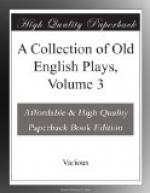Cla. Sing good Horatio, while I
sigh, and write.
According to my master Platos minde,
The soule is musicke, and doth therefore joy
In accents musicall, which he that hates
With points of discord is together tyed,
And barkes at Reason, Consonant in sense.
Divine Eugenia, beares the ocular forme
Of musicke, and of Reason, and presents
The soule exempt from flesh in flesh inflam’d[31];
Who must not love her then, that loves his soule?
To her I write; my friend, the starre[32] of friends
Will needs have my strange lines greet her strange
eies
And for her sake ile power my poore Soule forth
In floods of inke; but did not his kinde hand
Barre me with violent grace, I wood consume
In the white flames of her impassionate love,
Ere my harsh lipps shood vent the odorous blaze.
For I am desperate of all worldly joyes,
And there was never man so harsh to men.
When I am fullest of digested life
I seeme a livelesse Embrion to all,
Each day rackt up in night-like Funerall.
Sing, good Horatio, whilst I sigh, and write.
Canto.
The Letter.
Suffer him to love that suffers not loving;
my love
is without passion, and therefore free
from alteration._
Prose is too harsh, and Verse is Poetry.
Why shood I write; then? merrit[33] clad in inke
Is but a mourner, and as good as naked.
I will not write, my friend shall speake for me.
Sing one stave more, my good Horatio.
Canto.
I must remember I know whom I love
A dame of learning, and of life exempt
From all the idle fancies of her Sex,
And this, that to an other dame wood seeme
Perplext and foulded in a rudelesse[34] vaile,
Will be more cleere then ballads to her eye.
Ile write, if but to satisfie my friend.
Your third staunce sweet Horatio, and no more.
Canto.
How vainele doe I offer my strange love?
I marry, and bid states, and entertaine
Ladies with tales, and jests, and Lords with newes,
And keepe a House to feast Acteons hounds
That eate their Master, and let idle guests
Draw me from serious search of things divine?
To bid them sit, and welcome, and take care
To sooth their pallats with choyce kitchin-stuff,
As all must doe that marry, and keepe House,
And then looke on the left side of my yoake
Or on the right perhaps, and see my wife
Drawe in a quite repugnant course from me,
Busied to starch her French purles, and her puffs,
When I am in my Anima reflexa.
Quid est faelicitas? quae origo rerum?
And make these beings that are knowne to be
The onely serious object of true men
Seeme shadowes, with substantiall stir she keeps
About her shadowes, which if husbands love
They must beleeve; and thus my other selfe
Brings me another body to dispose,
That have already much too much of one,
And must not looke for any Soule of her
To helpe to rule two bodies?




